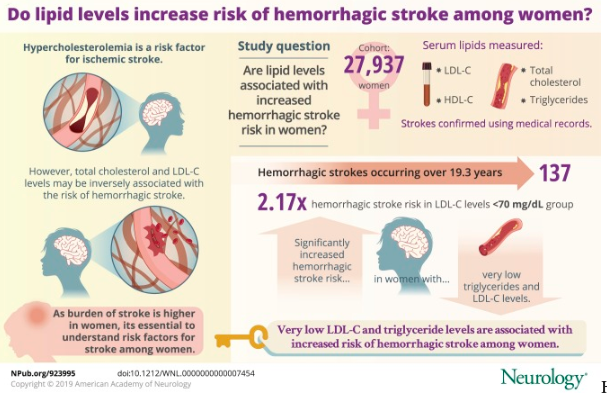Lowering LDL Increases Stroke Risk
- Dr. Thomas J. Lewis

- Feb 16, 2024
- 3 min read
Results: Low cholesterol (LDL-C <100 mg/dL), found in 1/4 of the MJ cohort, was highly prevalent (36%) among young adults (age 20–39).
There was a graded relationship between cholesterol and mortality for ICH [Hazard ratio, 1.56; 95% confidence interval (CI), 1.13–2.16].
Compared with patients with an LDL-C of 110–129 mg/dL in TSR, the risk for mortality was 1.84 (95% CI, 1.28–2.63) with an LDL-C of <100 mg/dL.
Summary: Chance of stroke is 56% greater if your LDL is < 100 when compared to 110-129 mg/dL.
If you look closely at the data, the risk of stroke can increase by 260%. This is when you compared the lowest LDL value to the highest LDL value.
Moral: Higher LDL prevents strokes.
How: LDL brings repairing lipids to rebuild deteriorating phospholipid membranes (your cell's wall structure)
A new study finds that women who have levels of LDL cholesterol 70 mg/dL or lower may be more than twice as likely to have a hemorrhagic stroke than women with LDL cholesterol levels from 100 to 130 mg/dL. The study is published in the April 10, 2019, online issue of Neurology®, the medical journal of the American Academy of Neurology.
There was a nearly threefold excess of thromboembolic stroke in men with low HDL cholesterol levels (<1.0 mmol/liter (<40 mg/dl)) compared with men with high levels (≥1.6 mmol/liter (≥60 mg/dl))
GUESS WHAT - IF YOU WANT YOUR LDL TO BE HIGH AND YOUR HDL TO BE HIGH - TO PREVENT STROKE, THAT MEANS.....
YOU WANT YOUR TOTAL CHOLESTEROL NUMBER TO BE HIGH TOO!
TOTAL CHOLESTEROL IS CALCULATED BY ADDING HDL AND LDL!
Conclusion
LDL-C levels <70 mg/dL and low triglyceride levels were associated with increased risk of hemorrhagic stroke among women.
Cholesterol levels below 180 mg/dl may be at risk for hemorrhagic stroke, particularly in hypertensive individuals.
Can Low Cholesterol Cause Stroke?
First of all, let me remind you that the term "cholesterol" is misused. When medicine refers to "cholesterol," they really mean "total cholesterol" which is the summation of:
LDL + HDL + 20% of your triglycerides number. Is there any actual cholesterol in that calculation?
ANSWER: NO
Here is the discussion on The People's Pharmacy.
Q. I take simvastatin, and I am concerned that my cholesterol may be too low (143, HDL 46, LDL 75). My mother died at age 64 from a massive stroke. Somewhere I read that very low cholesterol increases the risk of the bleeding type of stroke. How low is low?
A study presented at the American Heart Association Conference on Stroke demonstrated that men with cholesterol below 180 were at twice the risk of hemorrhagic stroke compared with those at 230 or above.
A Honolulu study many years ago showed that middle-age men with cholesterol below 150 had four times the risk of such a stroke.
There are some physicians who believe that you cannot have too low a golf score or too low a cholesterol level. We beg to disagree. Cholesterol is essential for life. Without it, you would die.
It forms the building blocks for crucial hormones like testosterone and estrogen. It is also key to the integrity of cell membranes.
I am not giving the link to people's pharmacy because they still suggest statins? Why? Did they not read their own article?
Healthy middle-aged individuals with total cholesterol below 160 mg/dL had significantly greater mortality from heart failure, hemorrhagic stroke, and cancer compared to moderate total cholesterol levels of 160-200 mg/dL (4.14–5.2 mmol/L). In this group of 12,334 individuals, levels 239 mg/dL (6.2 mmol/L) or above were not associated with an increased risk of death (Nago 2011).
Conclusions: Low cholesterol was related to high mortality even after excluding deaths due to liver disease from the analysis. High cholesterol was not a risk factor for mortality.
There is a 200% increase in total mortality, cancer mortality, and stroke mortality as total cholesterol goes DOWN!
Why the contradiction?
Most studies saying high cholesterol is bad are by American researcher supported by drug companies.
Maybe the Japanese are less susceptible to funding bias?
Weekly Webinar Links: Join us for detailed health information - at no charge. All are welcome.
Monday at noon EST -
Wednesday at 8 pm EST -

Be Bold - Be Brave - Stay Well
















Comments